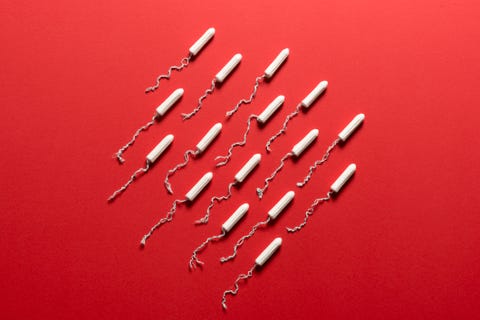The Keto Diet Might Make Your Periods Stop

When you’re on the keto diet, there are a few, uh, bodily changes you prepare for (the good: weight loss; and the not-so-good: keto flu).
One thing you might not be totally ready for: the keto diet wreaking havoc on your menstrual cycle—and possibly making your periods irregular.
“The keto diet can affect women’s periods due to the rapid weight loss some women have on it,” says Angela Chaudhari, M.D., gynecologist at Northwestern Memorial Hospital. “Rapid weight loss can alter your estrogen-progesterone balance and impact ovulation, therefore causing your periods to become more irregular.”
But period irregularity isn’t your only cause for concern on the keto diet—your period could even stop altogether.
“Women who lose weight rapidly or become very thin can become amenorrheic, meaning no periods, due to anovulation, or a lack of ovulation,” says Chaudhari.
Keep in mind, though, that this is likely due to rapid weight loss that may happen on the keto diet—but it’s not exclusive to the keto diet. “This can also occur due to a very low-calorie diet, excessive exercise, or having a very low BMI,” says Chaudhari. “This can cause some hormones in your brain that regulate ovulation to drop, and therefore prevent ovulation or delay ovulation leading to menstrual irregularity.”
Another period issue on the keto diet: the lack of carbs.
“The evidence is very limited, but extreme carbohydrate restriction may lead to changes in the lutenizing hormone, a hormone released from the brain,” says Chaudhari. When the body’s functioning normally, the lutenizing hormone contributes to regular ovulation, says Chaudhari; but when carbs are restricted—and the lutenizing hormone is compromised—it may cause amenorrhea or hypomenorrhea (short, light periods).
Is it all bad news? Can the keto do anything good for my cycle?
Actually, it might: The keto diet may be helpful to women with polycystic ovarian syndrome (PCOS), a hormonal disorder that prevents the ovaries from developing or releasing eggs, according to the Office on Women’s Health.
“There is emerging data that patients with PCOS, who usually have issues with fertility, [may help] restore regular periods and might help with fertility by making the patient more responsive to fertility treatments,” says Ula Abed Alwahab, M.D., an endocrinologist at the Cleveland Clinic.
That’s because, with PCOS, excess insulin in a woman’s body also increases her androgen and testosterone levels, which then limits her estrogen production and the body’s ability to ovulate.
The keto diet, however, can help decrease inflammation and insulin resistance, which can be to blame for higher than usual insulin levels seen in PCOS patients, says Alwahab.
Losing weight on the keto diet can also help PCOS symptoms.
“Weight loss is recommended for all women with PCOS and the ketogenic diet can be one method to help achieve weight-loss goals,” says Chaudhari. “By having a healthier BMI, women are more likely to ovulate regularly leading to more regular periods.”
But, as with any diet, it’s important to discuss going keto with your doctor before you do it—especially when you’re dealing with a medical issue like PCOS.
And instead of focusing on a specific diet, like the keto diet, it’s most important to find a sustainable and healthy diet that helps you maintain a healthy weight—and ultimately, a stable period, says Chaudhari.
“Patients who eat healthy, well-rounded diets and maintain normal BMIs are more likely to have regular ovulatory cycles,” says Chaudhari.
Source: Read Full Article


